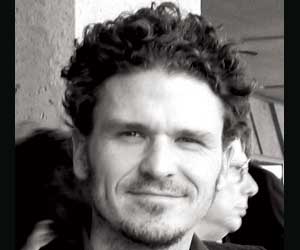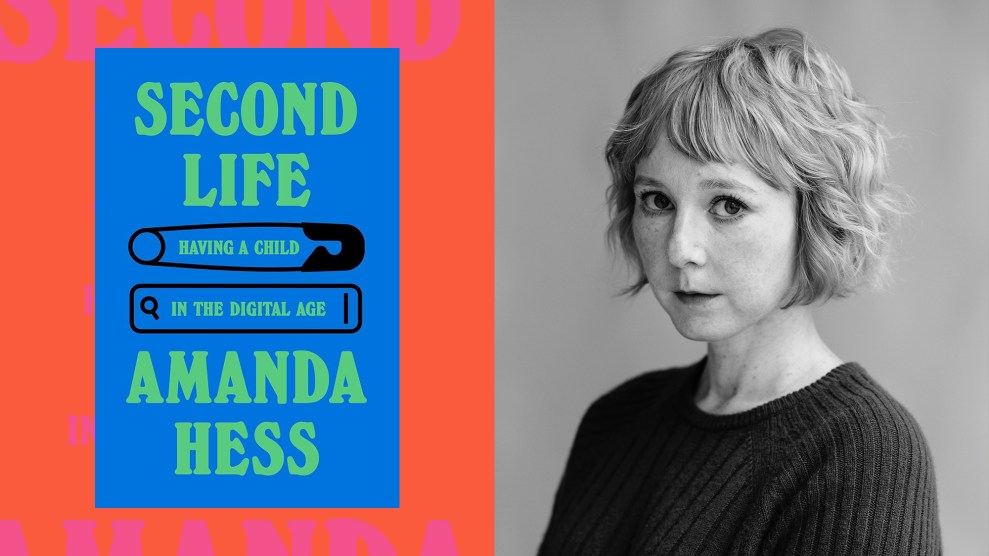
Photo: McSweeney's
It’s not easy keeping up with Dave Eggers, the pirate-loving, footnote-dropping McSweeney’s publisher, 826 Valencia founder, and Pulitzer-nominated novelist. One of his latest projects is Voice of Witness, a series of oral histories that has collected the first-person stories of Katrina evacuees, undocumented workers, and the wrongfully convicted. Out of Exile, the latest installment in his Voice of Witness series, presents the first-person tales of Sudanese refugees. Eggers says he was inspired by the late great listener Studs Terkel, whom he first encountered while growing up outside Chicago. “It’s important to hear primary sources, to hear people’s voices, as opposed to having it all filtered through some authoritative, professorial textbook voice,” says Eggers. He’s also seen how oral histories can draw in students in the classroom. “It’s a uniquely powerful way to get kids interested in subjects that otherwise could be made very dry and boring and unpalatable. But in this way it’s much more immediate, and you feel the blood going through it, and it leaks off the page.” Eggers spoke with Mother Jones at his office in San Francisco.
Mother Jones: What did you learn from Studs Terkel?
Dave Eggers: I had grown up as a fan of Studs Terkel. In Chicago he sort of looms large and is mentioned often. We had some of his books in our house and that was sort of my first introduction to the form, which I thought was fascinating. He was just an intriguing figure when you would see him on TV—he had a talk show and a radio show, so he was kind of all over the place. You couldn’t really avoid him. He was one of the biggest personalities out of Chicago. This was before Oprah. And he just looked like some guy out of a Cagney movie or something. The red-checked shirt and the red socks and his way of talking and that nose of his and everything. He had something very uniquely Chicago about him—real no-nonsense, no bullshit.
It’s amazing he lived as long as he did, and he was working pretty close to the end. I hope his legacy is done justice. It’s important to hear primary sources, to hear people’s voices as opposed to having it all filtered through some authoritative, professorial textbook voice. I’ve brought Surviving Justice into high schools and I’ve left them there, and they are the ones that everybody grabs. There are a lot of kids who don’t feel that their authentic voices are being heard. That’s what we are always doing at 826, is giving kids the ability to speak without that filter, and they are really attracted to these books in the same way, because they don’t necessarily always trust the spin. That’s how I went from Studs Terkel to the students. I think it’s a uniquely powerful way to get kids interested in subjects like this that otherwise could be made very dry and boring and unpalatable. But in this way it’s much more immediate, and you feel the blood going through it, and it leaks off the page because the voice is unfiltered.
MJ: What was the impetus for the current book?
DE: When I was in Sudan in 2003, Valentino [Achak Deng, the subject of What Is the What] and I interviewed some women who had been enslaved during the civil war and who had been recently returned to their hometowns. These women had been abducted when they were six, seven, eight years old and then taken to be servants, slaves, concubines in the northern part of the country. I had heard of the phenomenon of these abductions and the practice of slavery that was reinstituted during the civil war, but I hadn’t heard too much of these women’s stories. I thought there was something missing where they were not getting an opportunity to speak or be heard from at length, and so we interviewed them. But at that time we didn’t exactly know how to do it without re-traumatizing them, so we kept the interviews very brief. So Valentino and I kept them in our minds, sort of saying, “We have to get their stories out there, and next time we go to Sudan we have to do it better.”
MJ: Now that you’ve done several of these books, it’s interesting that there’s obviously a big need to have these stories told.
DE: What’s funny is that with each book there is some worry that those who have witnessed or been victim to these human rights abuses would be reluctant to talk. But then nine times out of ten, when you give someone a chance to speak and you say, “You are going to have control of your narrative; we’re going to listen as long as you’ll talk; we’re not going to just hit and run and get a few quotes and walk away,” then people get very serious and willing to open up and tell their whole story. Without that, what they went through—what they saw, what their ancestors went through, what their family went through—could be easily forgotten. That’s the worst crime of all—not only to have suffered, but that it never goes mentioned, it never gets reported, there’s no record of it, and the perpetrators get away with it. It’s the same reason the International Criminal Court exists and any number of human rights groups bear witness through storytelling and documentation: that such things go accounted for and maybe can be prevented from happening again.
MJ: Surviving Justice, which collected the stories of wrongfully convicted people, translated so perfectly because the whole problem with what they went through was that people didn’t believe their stories.
DE: Yes. In so many cases they had a story concocted for them, and that’s a problem with so much of the justice system. Again and again in Surviving Justice you read these victims and “the story that was told about me I just felt I was watching some other movie or it was just a story that had my name attached to it and nothing else about it was true.” We’ve had so many of our narrators say, “Thank God, there it is. No one can take it away, no one can alter it, at least I know, there it is told correctly, accurately, and fully.” That can remake somebody and make them as whole again as possible.
MJ: I imagine there’s a lot of risk for some of these people to talk to you?
DE: Sometimes. Almost all the narrators in Underground America have their names changed because they are all undocumented, and you never know when ICE is going to decide to target somebody. Even when I was in Sudan, the so-called husband of Achol [Mayuol, a woman who had been abducted into slavery as a child] had said, “Someday I’ll track you down, I’m going to kill you, I’m going to do harm to your family.” And we debated whether her name should be changed. She had no fear of that. She was defiant and really wanted her name there and to be on the record.
MJ: So why do you think that oral history is a better way to tell these stories rather than, say, just doing a nonfiction narrative?
DE: We’re not saying that, actually, because nonfiction narratives are really powerful and valid in themselves. I think that the two forms can coexist peacefully. But one thing that you don’t get sometimes from the more clinical or academic books or nonfiction books that are more policy oriented is that you don’t get to hear the person’s voice; you don’t get them as individuals. You get a few quotes and you hear them as sort of a case study: numbers, examples, anecdotes, maybe a paragraph here, and that’s about it. And with oral history and especially in the way we are trying to do it, the people are given full voice. You hear about them as individuals in all of their complexity, not as cardboard cutouts meant to advance whatever political agenda or point that the author is trying to make.
MJ: You started as a journalist. Now you’re a novelist, and your stories don’t always fit into the labels they want to put on the back of books. But oral history may be the most basic, oldest version of storytelling.
DE: Yeah, this is a much more basic and elemental form than some things I have done. I think that the simplicity of it is really appealing and the simplicity of the goal and the simplicity of how we put it together. Editing these is very hard work. It’s brick by brick. But the goal is the exact same: Let’s help these people tell these stories, and once we put it in order and it makes sense, we send it back and make sure they approve of it. I was able to bring a book to Achol, and that ability to close that loop and to have a promise that we would do justice to your story and here it is—it’s powerful.
MJ: Can you tell me about her reaction when she saw the book?
DE: In September I traveled back to Sudan. Valentino and I, we know where she lived, and the only way to get there is via bike. You have to go on these paths through sorghum fields for about two miles, through other people’s compounds, through cattle camps, before you get to Achol’s hut. She lives there with her five kids, all of whom she had with this man who had enslaved her. The last time, we were there all day, two days in a row interviewing her, so we got to know the kids and we gave them coloring books and markers and a lot of other things. She has beautiful kids and we had a lot of fun and got to know each other pretty well. So this is a full year later, and we are riding our bikes, and we came down the path into the clearing right before their house. Two of the kids, the oldest boys, saw us from 100 yards away and recognized us—there aren’t too many white guys riding their bike through that part of southern Sudan. They exploded into grins and the other kids came out too, and Achol, who is not a super-smiley person—she’s got a lot on her mind, so I don’t blame her—came out and when she saw us she shook her head and smiled. She couldn’t believe it. When we gave her the book, it was really kind of an incredibly moving experience for everybody. Her uncle, who spoke some English, was able to translate some of the book. To call it moving would be an understatement.
MJ: Has doing this project changed you?
DE: Yeah. Absolutely. I love to be surprised or challenged or told that I know less than I thought that I knew. I know it’s an old saw, but the older I get the less I know I know.
MJ: What were you able to achieve with What Is the What versus Out of Exile?
DE: They are so different. What Is the What is in essence a biography. Valentino told me a story, everything he could remember, and then outside of that I had to do a vast amount of research and put in all the historical context and all the stuff that some of which he knew and some of which he didn’t. So in every way the process was like writing an authorized biography. And then I would confuse things by putting it in first person. Up until the last eight months of writing it I had written it in the third person. But for four years [before that] it was in the third person.
MJ: How come you switched it?
DE: Because it sounded like me a little bit. I didn’t want the authorial voice to sound like me at all—a guy from the Chicago suburbs writing about Valentino’s life. I didn’t want to be present at all; I wanted to disappear completely. And Valentino’s voice is so powerful, and the way he speaks has this sort of biblical cadence to it. So I got to disappear; Valentino got to come forward.
MJ: Meanwhile, you’ve gone from writing memoirs to the exact opposite.
DE: Now I’m back in nonfiction. To me any given story has its appropriate form. There might be some story I get involved with that’s begging to be a graphic novel, so that will have to be that way. There’s always that matching of the content and the form, and that means everything to me. I spend years thinking about what that match is going to be before I can really make it work.
MJ: What’s your upcoming nonfiction book about?
DE: Can’t say. But it should be out in the spring. It’s the first time ever I’ve been this tight-lipped about something.
MJ: There is the recurring complaint that “kids these days” are no longer interested in reading and writing. Is that just BS? What is it about the work at 826 Valencia that gets kids excited to actually read and write?
DE: The kids we work with at 826 read more than I did at their age. They seem to have all read every Lemony Snicket book, every Harry Potter, every series you can think of. And these are kids from families where English isn’t spoken much at home, kids at underfunded public schools. So I don’t have much fear of the demise of books. Kids now treasure them for the same reasons we always have—because no medium can remotely compete with the power of a book. The only thing that everyone needs to look out for is keeping the students reading through high school and thereafter. There is a drop-off in the general rate of reading novels for pleasure at that point. But that problem is easily solved by enthusiastic teachers or parents. The weekly high school class I teach is just a reading class, really—we read about 100 pages of contemporary writing a week and discuss it. Then we edit it into the Best American Nonrequired Reading. The students read a lot more than that out of class, too; they’re not the least bit reluctant. But I give them a lot of say in what we read, and that’s a big factor. High school teachers who want to get reluctant readers turned around need to give the students some say in the reading list. Make it collaborative: The students will feel ownership, and everyone will dig in.
MJ: Do you think there is any validity to the idea that the death of irony is impending?
DE: Is the death of irony via Obama’s election? The funniest thing about that claim is that Obama is a guy with a very dry, very sophisticated sense of humor. So if anything, his election means that we’re no longer afraid of the subtle and offbeat. But really—every few months someone declares the death of irony, or the death of humor, or the death of writing, or the death of theater, dance, music, anything. The other day I heard Toni Morrison on the radio laughing about the need, every few months, for commentators to declare the death of some elemental part of our being. It’s always absurd on its face.
MJ: Voice of Witness is done on such a shoestring budget. That is obviously not the kind of business plan that any large publishing houses would accept, but in McSweeney’s case it is working. Do you think that serious readers can keep small book publishers like McSweeney’s alive? Or should we just buy Kindles and give up?
DE: Small readerships can support small presses, definitely. If we sell 3,000 copies of a VOW book, for example, we’re in pretty good shape; we will have paid for the book’s expenses. But generally, we do try to keep expenses low, and operate more as a co-op than anything else. There aren’t shareholders to please or a parent company. Any profits go back into our ability to put out more books. Book publishing will always do relatively well even in rough economic climates, because if you keep your overhead low, you can get by on pretty small numbers. Then again, 3,000 people reading about the Sudanese diaspora is, I think, a lot. And it’s a very meaningful number. Three thousand people at a protest for the rights of refugees would be seen as a significant statement, so 3,000 reading a full account of the lives of Sudanese refugees is a powerful statement.
MJ: There has been a lot of media attention about pirates in the real world with the situations off the coast of Somalia. Has this changed what goes on at 826 Valencia with the pirate theme or your thoughts on pirates?
DE: It’s been touchy. We’re always careful to distance ourselves from the actual real-life pirates out there. But I think people can limn the difference between Somali criminals on Zodiacs and the goofier pirate image we’ve collectively conjured.
















